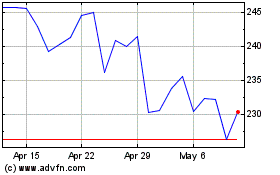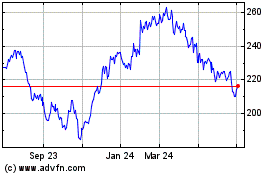Rail Executives Gathering to Address Investor Concerns
September 05 2015 - 5:59AM
Dow Jones News
By Laura Stevens
Railroads have been losing steam this year, weighed down by
falling commodity volumes, and there is little hope of improvement
on the track.
Rail executives from CSX Corp., Norfolk Southern Corp. and Union
Pacific Corp. this week will address investor concerns at a time
when an economic slowdown in China is fueling worries about global
economic growth. Those executives and others will be appearing
Wednesday and Thursday at the Cowen Group Inc.'s Global
Transportation Conference in Boston.
"Rails have become a lot more reliant upon commodities to fuel
growth, much more so than in years past. Consequently, China does
play a role," said Mark Levin, a rail analyst with BB&T Capital
Markets. "Commodity price moves are largely dictated by China's
consumption."
Coal demand has fallen 9% for rails so far this year as more
power plants switch to natural gas. Declining oil prices turned the
boom in shipping crude-by-rail into a bust, with petroleum and
related product shipments down 5% this year. And the railroads'
metal business is hurting, too, as natural-gas and oil producers
need fewer pipes for drilling and imports become cheaper.
As a result, rail stocks are down an average 26% so far this
year, according to BB&T Capital Markets, erasing last year's
22% increase. Since the start of July, the stocks are down about
9%, BB&T Capital said.
The decline in rail volumes has hit profits, too. Norfolk
Southern in July reported a 23% drop in second-quarter profit to
$433 million, adding that declining revenue from coal, crude oil
and fuel surcharges would pressure results for the second half of
the year. Union Pacific's profits dropped 7% to $1.2 billion in the
same quarter.
While CSX reported that cost-cutting helped fuel a 4.5% rise in
its quarterly profit, it issued a similar warning on coal.
Executives speaking at the Cowen conference are also likely to
highlight efforts to scale back their networks to accommodate lower
volumes and cost-cutting measures like furloughing employees and
storing trains.
The rails are likely to provide a better "understanding of where
they are getting the rail costs in line with the volume," said
David Vernon, an analyst with Sanford C. Bernstein & Co. "If
the volume starts to moderate and finds the floor, they should be
able to catch up with it."
Much of the problem stems from booms in cargo last year, when
traffic volumes increased 4.5% across the board and railroads
scrambled to add resources to accommodate the gains and to keep
cargo moving. But as energy prices declined this year, volumes were
hit, raising the question of whether pricing can hold up.
Railroads have been competing with trucking for intermodal
volume, or the transportation of trailers and containers. That type
of volume is up 2.6% so far this year, but as fuel prices fall,
trucking has become more competitive with rails.
Still, rail "pricing is still very strong, and even
accelerating," said Justin Long, a Stephens Inc. analyst who met
with the major railroads in recent days. "From a service
perspective, too, things are getting better."
The Week Ahead looks at coming corporate events.
Write to Laura Stevens at laura.stevens@wsj.com
Subscribe to WSJ: http://online.wsj.com?mod=djnwires
(END) Dow Jones Newswires
September 05, 2015 05:44 ET (09:44 GMT)
Copyright (c) 2015 Dow Jones & Company, Inc.
Norfolk Southern (NYSE:NSC)
Historical Stock Chart
From Mar 2024 to Apr 2024

Norfolk Southern (NYSE:NSC)
Historical Stock Chart
From Apr 2023 to Apr 2024
